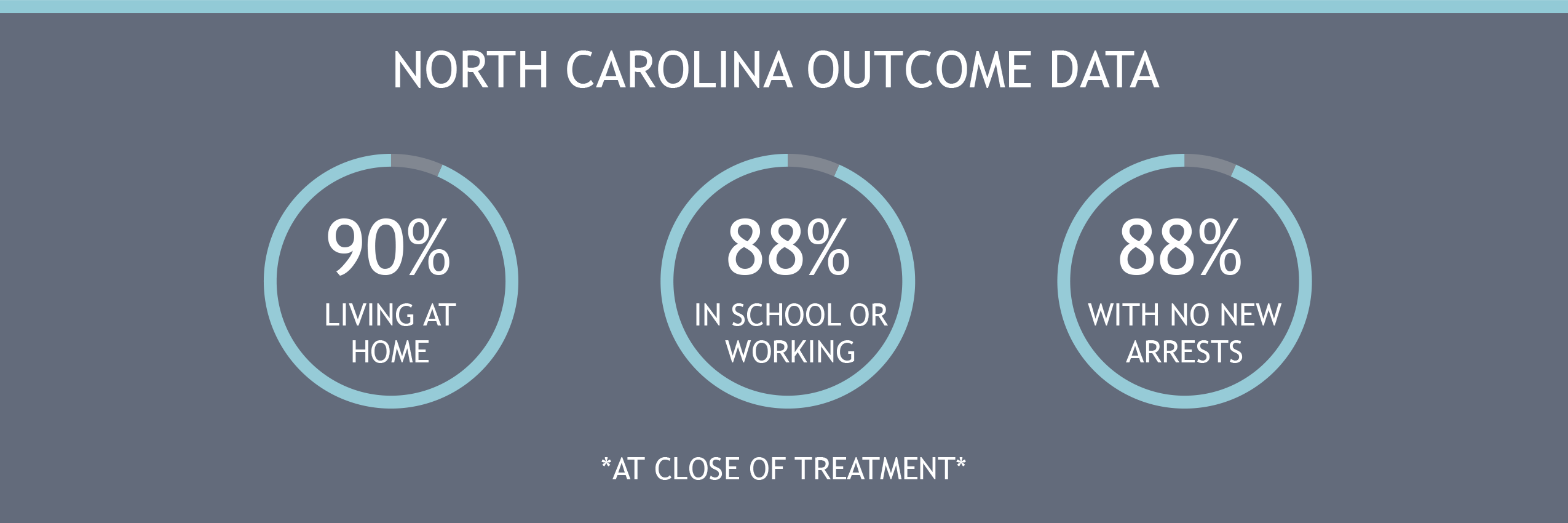How MST Came to North Carolina
In 2009, North Carolina’s juvenile justice system needed a new answer. The state had been experiencing high rates of juvenile incarceration, which started to cause significant budgetary stress on the system. Soon, budget cuts were necessary and the state began to close group homes for delinquent youth.
In response, policy leaders voiced increasing support for evidence-based practices (EBPs) to reduce the long term cost of youth services. In particular, Multisystemic Therapy (MST) was identified as a solution to North Carolina’s financial problems, given its track record of saving taxpayer dollars and its emphasis on service provider accountability.
To ensure quality service delivery, the state revised their Medicaid standards for MST to assign a major role for provider accountability to MST Services (MSTS) through the licensing and ongoing program support associated with its treatment model. The growth in MST in North Carolina has been particularly impressive – in 2008, there were 8 MST teams in operation, and today that number has grown to 33.
MST Champions
MST in North Carolina benefits from a diverse group of stakeholders who are committed to helping evidence-based programs succeed. These stakeholders meet frequently to troubleshoot implementation challenges, and problems when funding issues.
In particular, MST benefits from having champions in the Division of Mental Health, as well as in the Departments of Public Safety and Juvenile Justice. There are also crucial advocates in provider agencies, such as Beacon Health Options, as well as in the various Managed Care Organizations (MCOs) across the state.
“I wanted to send you a note and let you know how helpful the MST therapist has been to our family. She has given us consistency and guidance that we have sorely needed. She is such an intuitive, intelligent counselor....I wish more parents had the benefit that MST has provided to us.”
- Mother of an MST Youth
Strengths of MST in North Carolina
The MST program in North Carolina benefits from a strategic state vision. The state values the services provided by MST and has asked MST Services to oversee the expansion of teams, focusing on the sustainable growth of the program. This strategic vision has led to the development of a stringent assessment process when agencies want to begin new MST teams, which allows the MST program to ensure there is no over-saturation of providers. This smart and strategic growth plan has contributed to a strong network of providers across the state, and minimized competition between agencies for referrals.

MST in North Carolina: Lessons Learned
MST has been tremendously successful in North Carolina, and the significant growth in MST has inspired the program to double down on their efforts to educate stakeholders, particularly referral sources, on both the criteria for MST and the impact of the program. The program emphasizes training of their internal staff – such as supervisors and program managers – so that they can be effective in communicating the unique features of MST that make it so successful. This commitment to educating stakeholders about the proven effectiveness of MST is crucial to the success of any MST program.
In particular, North Carolina closely monitors the utilization rates of their existing teams to identify situations in which use of MST in North Carolina may not be fully optimized. They use low utilization as an opportunity to reengage stakeholders and to ensure that the benefits of MST are being clearly communicated. Future teams should take note of this approach to monitoring utilization and being proactive about engaging stakeholders to foster success in their own MST programs.
If you know of someone that would benefit from MST or you would like to start an MST program in your area, please click here.


